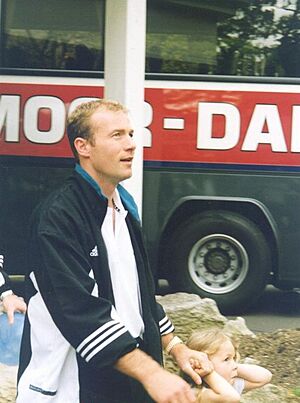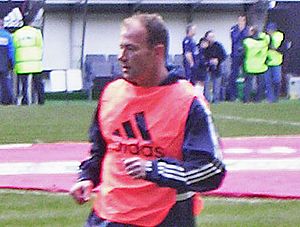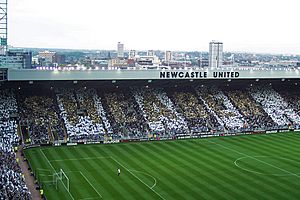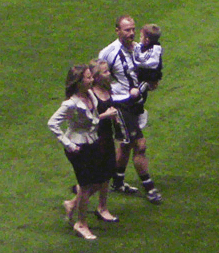Alan Shearer facts for kids
Quick facts for kids
Alan Shearer
CBE DL
|
|||||||||||||||||||||||||||||||||||||||||||||||||||||||||||||||||||||
|---|---|---|---|---|---|---|---|---|---|---|---|---|---|---|---|---|---|---|---|---|---|---|---|---|---|---|---|---|---|---|---|---|---|---|---|---|---|---|---|---|---|---|---|---|---|---|---|---|---|---|---|---|---|---|---|---|---|---|---|---|---|---|---|---|---|---|---|---|---|
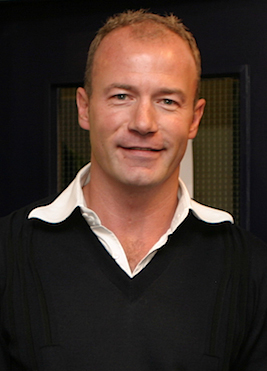
Shearer in 2008
|
|||||||||||||||||||||||||||||||||||||||||||||||||||||||||||||||||||||
| Born | 13 August 1970 Newcastle upon Tyne, England
|
||||||||||||||||||||||||||||||||||||||||||||||||||||||||||||||||||||
| Occupation | Football pundit, footballer | ||||||||||||||||||||||||||||||||||||||||||||||||||||||||||||||||||||
| Height | 6 ft 0 in (1.83 m) | ||||||||||||||||||||||||||||||||||||||||||||||||||||||||||||||||||||
| Spouse(s) |
Lainya Shearer
(m. 1991) |
||||||||||||||||||||||||||||||||||||||||||||||||||||||||||||||||||||
| Children | 3 | ||||||||||||||||||||||||||||||||||||||||||||||||||||||||||||||||||||
|
Association football career
|
|||||||||||||||||||||||||||||||||||||||||||||||||||||||||||||||||||||
Alan Shearer, born on 13 August 1970, is a famous English football expert and former professional player. He was an amazing striker on the field. Many people consider him one of the best strikers ever and a legendary player in the Premier League. He holds the record for scoring the most goals in the Premier League, with an incredible 260 goals!
Alan won several important awards during his career. He was named the Football Writers' Association Player of the Year in 1994 and the PFA Player of the Year in 1995. In 1996, he was even ranked as the third-best player in the world for both the Ballon d'Or and FIFA World Player of the Year awards. The legendary footballer Pelé included him in the FIFA 100 list of the world's greatest living players in 2004. In 2021, Alan Shearer became one of the first two players to be inducted into the Premier League Hall of Fame.
He spent his entire playing career in England's top football league. He started at Southampton in 1988. Then, in 1992, he moved to Blackburn Rovers. There, he became known as one of Europe's top goalscorers and helped Blackburn win the Premier League title in 1995. In 1996, he joined his hometown club, Newcastle United, for a world-record transfer fee of £15 million. In his first season with Newcastle, he won his third straight Premier League Golden Boot. He also played in the FA Cup finals in 1998 and 1999, captaining the team in the second one. He eventually became Newcastle United's all-time leading goalscorer before retiring at the end of the 2005–06 season.
Alan also played for the England national team, appearing 63 times and scoring 30 goals. His biggest success with England was at UEFA Euro 1996, where England reached the semi-finals. Alan won the Golden Boot as the top scorer and was named in the tournament's best team. He later captained England at the 1998 FIFA World Cup and UEFA Euro 2000 before retiring from international football.
After he stopped playing in 2006, Alan Shearer became a popular television football expert for the BBC. In 2009, he briefly managed Newcastle United for eight games, trying to save them from being relegated, but it was unsuccessful. Alan has also received many honors, including being a Commander of the Order of the British Empire (CBE) and a Deputy Lieutenant of Northumberland. He is also a Freeman of Newcastle upon Tyne and holds honorary degrees from Northumbria and Newcastle Universities.
Contents
Growing Up and Starting Football
Alan Shearer was born on 13 August 1970 in Gosforth, a part of Newcastle upon Tyne. His father, Alan, worked with sheet metal, and his mother was Anne. Alan's dad encouraged him to play football when he was young, and he loved the sport throughout his school years. He went to Gosforth Central Middle School and Gosforth High School.
When he was a boy, Alan played football on the streets of Newcastle. He started as a midfielder because he felt he could be more involved in the game that way. He was the captain of his school team and helped a Newcastle City Schools team win a tournament at St James' Park. As a teenager, he joined the Wallsend Boys Club, a local amateur team.
It was at Wallsend Boys Club that a scout from Southampton, named Jack Hixon, noticed Alan's talent. This led to Alan spending his summers training with Southampton's youth team. He later said this time was "the making of me." Alan also had successful tryouts with other big clubs like West Bromwich Albion, Manchester City, and Newcastle United. However, he accepted a youth contract with Southampton in April 1986.
Club Career Highlights
Playing for Southampton (1986–1992)
After two years with the youth team, Alan joined Southampton's main team. He played his first professional game on 26 March 1988 as a substitute against Chelsea. Just two weeks later, in his first full game at The Dell, he made headlines across the country. He scored three goals, a hat-trick, helping his team win 4–2 against Arsenal. At 17 years and 240 days old, he became the youngest player to score a hat-trick in the top league, breaking a 30-year-old record! He finished that season with three goals in five games and earned his first professional contract.
Even with such a great start, Alan was slowly brought into the first team. He played ten games without scoring the next season. Throughout his career, Alan was known for his strength. At Southampton, this helped him keep the ball and create chances for teammates like Rod Wallace and Matt Le Tissier. He scored three goals in 26 games in the 1989–90 season and four goals in 36 games the following year. Fans noticed his great play and voted him their Player of the Year in 1991.
In 1991, Alan was part of the England under-21 squad for the Toulon Tournament in France. He was the star of the tournament, scoring seven goals in four games. During the 1991–92 season, Alan became even more famous. He scored 13 goals in 41 games for Southampton, which led to him being called up to the England senior team. He even scored in his first game for England. Many news reports suggested he might move to Manchester United that summer. Alan decided to stay with Southampton for the rest of the season, even though other big clubs were interested.
In July 1992, Alan Shearer was sold to Blackburn Rovers for £3.6 million. This was a huge amount of money at the time. At just under 22 years old, Alan became the most expensive player in British football history. In his four years with Southampton, he played 158 games and scored 43 goals.
Winning the League with Blackburn Rovers (1992–1996)
After playing in UEFA Euro 1992 for England, Alan Shearer became the subject of a record-breaking transfer bid. Blackburn Rovers paid £3.6 million to sign him. Manchester United was also interested, but Blackburn's owner, Jack Walker, made sure Alan came to Ewood Park.
On 15 August 1992, the first weekend of the new Premier League season, Alan scored two goals against Crystal Palace. He missed half of his first season with Blackburn due to a knee injury in December 1992. However, he still managed to score 16 goals in the 21 games he played. This season, he also became a regular player for England and scored his second international goal.
When he returned from injury for the 1993–94 season, Alan scored 31 goals in 40 games. Blackburn finished second in the Premier League. His amazing performances earned him the Football Writers' Association Footballer of the Year award that season.
The 1994–95 season saw Chris Sutton join Blackburn, forming a powerful attacking duo with Alan. Alan scored 34 goals, and Sutton added 15. This partnership, nicknamed "the SAS" (Shearer And Sutton), helped Blackburn win the Premier League title on the very last day, beating rivals Manchester United. Alan also played in the UEFA Cup that season, scoring one goal. For his efforts, Alan was named the PFA Players' Player of the Year in 1995.
Even though Blackburn couldn't win the title again the next year, Alan was still the Premier League's top scorer with 31 goals in 35 games. Blackburn also played in the Champions League that season, where Alan scored one goal. He reached 100 goals for Blackburn in all competitions on 23 September 1995, scoring a hat-trick against Coventry City. On 30 December, he scored his 100th Premier League goal, becoming the first player to reach that milestone. His final total for Blackburn was 112 goals in the Premier League and 130 goals in all competitions.
Becoming a Legend at Newcastle United (1996–2006)
After Euro 96, many top clubs like Manchester United and Real Madrid wanted to sign Alan. However, Alan chose to join his boyhood club, Newcastle United. On 30 July 1996, he moved to Newcastle for a world record transfer fee of £15 million. His hero, Kevin Keegan, was the manager at the time.
Alan made his league debut for Newcastle on 17 August 1996 against Everton. He continued his excellent form, finishing as the Premier League's top scorer for the third season in a row with 25 goals in 31 games. He also won another PFA Player of the Year award. Newcastle finished second in the league that year.
The 1997–98 season was tough for Alan due to an ankle injury. He only scored two goals in 17 games. Newcastle, then managed by Kenny Dalglish, had a good run in the FA Cup. Alan scored the winning goal in the semi-final against Sheffield United, leading the team to the final. However, they lost 2–0 to Arsenal at Wembley.
In the 1998–99 season, Alan was mostly free from injuries. He scored 14 goals in 30 league games and became Newcastle's captain, replacing Rob Lee. Newcastle reached a second consecutive FA Cup final, with Alan scoring twice in the semi-final against Tottenham Hotspur. But they lost 2–0 again, this time to Manchester United.
On the first day of the 1999–2000 season, Alan received the first red card of his career in his 100th game for Newcastle. Manager Ruud Gullit was later replaced by the experienced Bobby Robson. In Robson's first game in charge, Alan scored five goals in an amazing 8–0 win against Sheffield Wednesday. With Robson, the team improved, and Alan scored 23 goals that season.
The 2000–01 season was frustrating for Alan due to injuries. He had retired from international football to focus on his club, but only managed five goals in 19 league games. The 2001–02 season was much better, with Alan scoring 23 goals in 37 league games. Newcastle finished fourth, which meant they qualified for the Champions League.
The 2002–03 season saw Alan and Newcastle return to the UEFA Champions League. Newcastle lost their first three group matches, but Alan's goal against Dynamo Kyiv and wins against Juventus and Feyenoord helped them move to the next stage. Alan scored a Champions League hat-trick against Bayer Leverkusen and two goals against Inter Milan. He finished the season with seven Champions League goals and 17 league goals, totaling 25 goals as the team finished third in the Premier League.
In the 2003–04 season, Newcastle played in the UEFA Cup. Alan's six goals helped the club reach the semi-finals, where they lost to Olympique de Marseille. He also had a good domestic season, scoring 22 goals in 37 games.
Alan had planned to retire after the 2004–05 season. He scored seven goals in 28 games that year. The club did well in cup competitions, reaching the UEFA Cup quarter-finals and the FA Cup semi-finals. Alan scored a hat-trick in the UEFA Cup against Hapoel Bnei Sakhnin and finished with 11 European goals.
In 2005, manager Graeme Souness convinced Alan to play for one more season as a player-coach. In his final season, 2005–06, Alan broke Jackie Milburn's 49-year-old record of 200 goals for Newcastle United. He scored his 201st goal against Portsmouth on 4 February 2006, becoming the club's all-time leading goalscorer with 206 goals. On 17 April 2006, with three games left in his career, Alan suffered a knee injury during a 4–1 win against Sunderland, where he scored his final goal. This injury meant he had to retire earlier than planned.
Tribute and Testimonial Match
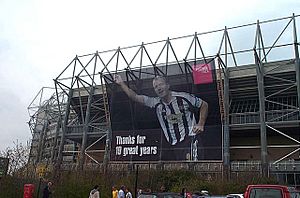
To honor Alan Shearer's amazing contributions to Newcastle United for over ten years, the club put up a huge banner of him outside St James' Park. The banner was 25 meters high and 32 meters wide, covering almost half of the Gallowgate End stand. It showed Alan as the "Gallowgate Giant," celebrating a goal with his arm raised, and said "Thanks for 10 great years." This banner was displayed from 19 April to 11 May 2006.
Alan was also given a special testimonial match against Scottish team Celtic. All the money raised from this match went to charity. Because of his knee injury, Alan couldn't play the whole game, but he kicked off the match and later came on as a substitute to score a penalty. Newcastle won the game 3–2. The stadium was completely full, and Alan did a lap of honor with his family at the end, with his young son covering his ears because of the loud cheers from the crowd.
International Career with England
Alan Shearer's international career began in 1990 with the England under-21 squad. He scored an impressive 13 goals in 11 games, a record that still stands. His great performances led to him being called up to the senior England team by manager Graham Taylor. He scored in his debut game against France in February 1992.
UEFA Euro 1996 was a very successful tournament for Alan and England. Alan had not scored in 12 international games before this tournament. However, he scored in the first game against Switzerland. He then scored against Scotland and twice in a 4–1 win over the Netherlands, helping England reach the next stage. In the quarter-finals, England beat Spain in a penalty shootout, with Alan scoring England's first penalty. In the semi-final against Germany, Alan scored early, but Germany equalized, and the match went to penalties again. Germany won this time, and England was eliminated. Alan's five goals made him the tournament's top scorer, and he was named in the official UEFA team of the tournament.
The new England manager Glenn Hoddle made Alan captain for the 1998 FIFA World Cup qualifier against Moldova in September 1996. Alan kept the captaincy and scored five goals in England's successful qualification for the World Cup. In the World Cup finals, he scored England's first goal in a 2–0 win over Tunisia. England faced Argentina in the second round. Alan scored a penalty to equalize in the first half. The game ended 2–2 and went to penalties. Alan scored his penalty, but England was eliminated. This was Alan's only World Cup tournament.
In September 1999, Alan scored his only England hat-trick in a UEFA Euro 2000 qualifier against Luxembourg. This helped England reach a play-off against Scotland, which they won to qualify for the European Championship. Alan, nearing his 30th birthday, announced he would retire from international football after Euro 2000.
He did not score in England's opening defeat against Portugal at Euro 2000, but he did score in England's 1–0 win against Germany. This was England's first competitive win against Germany since the 1966 World Cup final. To stay in the tournament, England needed a draw against Romania. Alan scored a penalty, but Romania won 3–2, and England was out. This marked the end of Alan's international career. He played 63 games for England, captained the team 34 times, and scored 30 goals. He is ranked 7th on the England all-time goalscorers list.
Alan Shearer's Playing Style
Alan Shearer is widely considered one of the best strikers ever and a top player in Premier League history. He was known as a classic English centre-forward because of his strength, physical presence, excellent heading ability, and powerful shot. These qualities made him a very successful goalscorer. Out of his 206 goals for Newcastle, 49 were scored with his head.
Earlier in his career, especially at Southampton, Alan played a more creative role. He would create chances for other strikers and make smart runs into open spaces. This was because of his good link-up play, hard work, and his early training as a midfielder. Later in his career, as he got older and lost some speed, Alan played more as a pure forward. He was great at holding the ball up and passing it to other players. While his strength helped him keep possession, some people thought his playing style was sometimes too physical.
Alan was also a very skilled penalty taker for both his clubs and country. He scored 45 penalties for Newcastle, where he was the main penalty taker. With 56 goals from 67 attempts, he is the most successful penalty taker in Premier League history. He also scored five goals from free-kicks for Newcastle. He was known for his accuracy and powerful shots from outside the penalty area, both from set-pieces and during open play. He also stood out for his leadership skills throughout his career.
Managerial Role
Briefly Managing Newcastle United (2009)
After retiring as a player, Alan Shearer said he wanted to take some time off before possibly moving into management. He also mentioned that he would only consider managing "when the time was right." He turned down coaching roles with England and Newcastle in the years after his retirement.
However, in a surprising move on 1 April 2009, Alan was announced as the manager of his former club, Newcastle United. He took charge for the last eight games of the season. His goal was to save the team from being relegated from the Premier League. Alan said, "It's a club I love and I don't want them to go down. I'll do everything I can to stop that."
Alan's first game as manager was a 2–0 loss to Chelsea. On 11 April, Newcastle earned their first point under Alan with a 1–1 draw against Stoke City. His first win came in a 3–1 victory over Middlesbrough, which temporarily moved Newcastle out of the relegation zone.
On the final day of the season, 24 May, Newcastle faced relegation to the Championship. After losing 1–0 to Aston Villa, Newcastle was relegated along with Middlesbrough. This ended their 16-year stay in the Premier League. Alan's eight games as manager resulted in only five points out of a possible twenty-four.
Alan did not get the manager's job permanently. Chris Hughton took over and successfully led Newcastle back to the Premier League the following season.
Life Outside Football
Personal Life and Family
Alan Shearer met his wife, Lainya, while he was playing for Southampton. They got married on 8 June 1991 and have three children together. Alan has described his wife as a private person who doesn't enjoy the public attention that comes with his fame. He often said that he stayed in England during his career, even turning down offers from clubs like Juventus or Barcelona, because he didn't want to move his family. In May 2006, his family joined him on the pitch at St James' Park for a lap of honor after his testimonial match.
Honors and Recognition
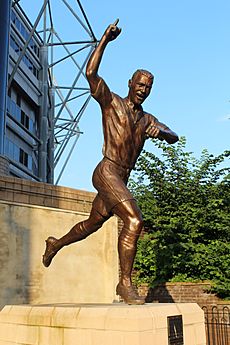
On 6 December 2000, Alan Shearer was given the Honorary Freedom of Newcastle upon Tyne. This was to recognize his role as captain of Newcastle United and former captain of England, which brought great fame to the city. He was appointed an Officer of the Order of the British Empire (OBE) in 2001 and a Commander of the Order of the British Empire (CBE) in 2016 for his charity work in North East England.
Alan has also received honorary degrees. On 4 December 2006, Northumbria University made him a Doctor of Civil Law. On 1 October 2009, he became a Deputy Lieutenant of Northumberland, a role where he helps represent the Queen in the region. On 7 December 2009, Newcastle University also awarded him a Doctor of Civil Law. On 12 September 2016, a statue of Alan Shearer was unveiled outside St James' Park, showing him in his famous goal celebration pose.
In 2021, Alan Shearer was announced as the first player to be inducted into the Premier League Hall of Fame.
Media Work
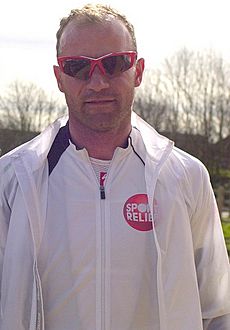
After retiring from playing, Alan Shearer became a regular football expert for the BBC's Match of the Day. He has also been part of the BBC team covering World Cups and European Championships since 2006.
During his playing career, Alan appeared in commercials for the sports drink Lucozade. He is one of many famous British athletes who have promoted the brand.
Alan Shearer is also featured in EA Sports' FIFA video game series. He was included in the FIFA 15 Ultimate Team Legends.
In March 2023, when Gary Lineker was temporarily suspended from hosting Match of the Day for breaching BBC rules, Alan Shearer and other experts showed their support by refusing to present the show. In November 2024, it was announced that Alan Shearer would manage one of the teams in the new Baller League, a six-a-side football league.
Charity Work
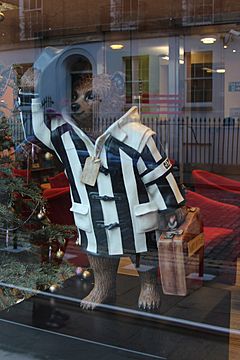
Throughout his playing career, Alan Shearer was involved with the National Society for the Prevention of Cruelty to Children (NSPCC). Since retiring, he has continued to work with many charities, both nationally and in the Newcastle area.
His testimonial match raised £1.64 million for fourteen good causes. This included £400,000 for the NSPCC and £320,000 to complete the "Alan Shearer Centre," a special care facility in Newcastle. In October 2006, he became an ambassador for the NSPCC, calling it "the kick-off to my most important role yet." He has also worked with The Dream Foundation. In 2006, Alan started the Alan Shearer Academy Scholarship to help talented young players in the region.
In 2008, he raised over £300,000 for Sport Relief by completing a bike ride with fellow Match of the Day presenter Adrian Chiles. Alan also played and scored twice in Soccer Aid, a charity game at Wembley Stadium in September 2008, to raise money for UNICEF.
On 26 July 2009, Alan played and scored in the Sir Bobby Robson Trophy match. This charity game at St James' Park honored Bobby Robson and raised money for his cancer charity, the Sir Bobby Robson Foundation. It was Bobby Robson's last public appearance before he passed away five days later. On 15 October 2009, Alan Shearer became the new patron of the Sir Bobby Robson Foundation.
Career Statistics
Club Appearances and Goals
| Club | Season | League | FA Cup | League Cup | Europe | Other | Total | |||||||
|---|---|---|---|---|---|---|---|---|---|---|---|---|---|---|
| Division | Apps | Goals | Apps | Goals | Apps | Goals | Apps | Goals | Apps | Goals | Apps | Goals | ||
| Southampton | 1987–88 | First Division | 5 | 3 | 0 | 0 | 0 | 0 | – | – | 5 | 3 | ||
| 1988–89 | First Division | 10 | 0 | 0 | 0 | 0 | 0 | – | – | 10 | 0 | |||
| 1989–90 | First Division | 26 | 3 | 3 | 0 | 6 | 2 | – | – | 35 | 5 | |||
| 1990–91 | First Division | 36 | 4 | 4 | 2 | 6 | 6 | – | 2 | 2 | 48 | 14 | ||
| 1991–92 | First Division | 41 | 13 | 7 | 2 | 6 | 3 | – | 6 | 3 | 60 | 21 | ||
| Total | 118 | 23 | 14 | 4 | 18 | 11 | – | 8 | 5 | 158 | 43 | |||
| Blackburn Rovers | 1992–93 | Premier League | 21 | 16 | 0 | 0 | 5 | 6 | – | – | 26 | 22 | ||
| 1993–94 | Premier League | 40 | 31 | 4 | 2 | 4 | 1 | – | – | 48 | 34 | |||
| 1994–95 | Premier League | 42 | 34 | 2 | 0 | 3 | 2 | 2 | 1 | – | 49 | 37 | ||
| 1995–96 | Premier League | 35 | 31 | 2 | 0 | 4 | 5 | 6 | 1 | 1 | 0 | 48 | 37 | |
| Total | 138 | 112 | 8 | 2 | 16 | 14 | 8 | 2 | 1 | 0 | 171 | 130 | ||
| Newcastle United | 1996–97 | Premier League | 31 | 25 | 3 | 1 | 1 | 1 | 4 | 1 | 1 | 0 | 40 | 28 |
| 1997–98 | Premier League | 17 | 2 | 6 | 5 | 0 | 0 | 0 | 0 | – | 23 | 7 | ||
| 1998–99 | Premier League | 30 | 14 | 6 | 5 | 2 | 1 | 2 | 1 | – | 40 | 21 | ||
| 1999–2000 | Premier League | 37 | 23 | 6 | 5 | 1 | 0 | 6 | 2 | – | 50 | 30 | ||
| 2000–01 | Premier League | 19 | 5 | 0 | 0 | 4 | 2 | – | – | 23 | 7 | |||
| 2001–02 | Premier League | 37 | 23 | 5 | 2 | 4 | 2 | 0 | 0 | – | 46 | 27 | ||
| 2002–03 | Premier League | 35 | 17 | 1 | 1 | 0 | 0 | 12 | 7 | – | 48 | 25 | ||
| 2003–04 | Premier League | 37 | 22 | 2 | 0 | 1 | 0 | 12 | 6 | – | 52 | 28 | ||
| 2004–05 | Premier League | 28 | 7 | 4 | 1 | 1 | 0 | 9 | 11 | – | 42 | 19 | ||
| 2005–06 | Premier League | 32 | 10 | 3 | 1 | 2 | 1 | 4 | 2 | – | 41 | 14 | ||
| Total | 303 | 148 | 36 | 21 | 16 | 7 | 49 | 30 | 1 | 0 | 405 | 206 | ||
| Career total | 559 | 283 | 58 | 27 | 50 | 32 | 57 | 32 | 10 | 5 | 734 | 379 | ||
International Appearances and Goals
| National team | Year | Apps | Goals |
|---|---|---|---|
| England | 1992 | 6 | 2 |
| 1993 | 1 | 0 | |
| 1994 | 6 | 3 | |
| 1995 | 8 | 0 | |
| 1996 | 9 | 8 | |
| 1997 | 5 | 3 | |
| 1998 | 11 | 6 | |
| 1999 | 10 | 6 | |
| 2000 | 7 | 2 | |
| Total | 63 | 30 | |
- Scores and results list England's goal tally first, score column indicates score after each Shearer goal.
| No. | Date | Venue | Cap | Opponent | Score | Result | Competition |
|---|---|---|---|---|---|---|---|
| 1 | 19 February 1992 | Wembley Stadium, London | 1 | 1–0 | 2–0 | Friendly | |
| 2 | 18 November 1992 | Wembley Stadium, London | 6 | 2–0 | 4–0 | 1994 FIFA World Cup qualification | |
| 3 | 17 May 1994 | Wembley Stadium, London | 9 | 1–0 | 5–0 | Friendly | |
| 4 | 7 September 1994 | Wembley Stadium, London | 11 | 1–0 | 2–0 | Friendly | |
| 5 | 2–0 | ||||||
| 6 | 8 June 1996 | Wembley Stadium, London | 24 | 1–0 | 1–1 | UEFA Euro 1996 | |
| 7 | 15 June 1996 | Wembley Stadium, London | 25 | 1–0 | 2–0 | UEFA Euro 1996 | |
| 8 | 18 June 1996 | Wembley Stadium, London | 26 | 1–0 | 4–1 | UEFA Euro 1996 | |
| 9 | 3–0 | ||||||
| 10 | 26 June 1996 | Wembley Stadium, London | 28 | 1–0 | 1–1 | UEFA Euro 1996 | |
| 11 | 1 September 1996 | Stadionul Republican, Chişinău | 29 | 3–0 | 3–0 | 1998 FIFA World Cup qualification | |
| 12 | 9 October 1996 | Wembley Stadium, London | 30 | 1–1 | 2–1 | 1998 FIFA World Cup qualification | |
| 13 | 2–1 | ||||||
| 14 | 30 April 1997 | Wembley Stadium, London | 32 | 2–0 | 2–0 | 1998 FIFA World Cup qualification | |
| 15 | 31 May 1997 | Stadion Slaski, Chorzów | 33 | 1–0 | 2–0 | 1998 FIFA World Cup qualification | |
| 16 | 7 June 1997 | Stade de la Mosson, Montpellier | 34 | 1–0 | 1–0 | 1997 Tournoi de France | |
| 17 | 22 April 1998 | Wembley Stadium, London | 38 | 1–0 | 3–0 | Friendly | |
| 18 | 3–0 | ||||||
| 19 | 15 June 1998 | Stade Vélodrome, Marseille | 40 | 1–0 | 2–0 | 1998 FIFA World Cup | |
| 20 | 30 June 1998 | Stade Geoffroy-Guichard, Saint-Étienne | 43 | 1–1 | 2–2 | 1998 FIFA World Cup | |
| 21 | 5 September 1998 | Råsundastadion, Stockholm | 44 | 1–0 | 1–2 | UEFA Euro 2000 qualifying | |
| 22 | 14 October 1998 | Stade Josy Barthel, Luxembourg City | 46 | 2–0 | 3–0 | UEFA Euro 2000 qualifying | |
| 23 | 28 April 1999 | Nepstadion, Budapest | 49 | 1–0 | 1–1 | Friendly | |
| 24 | 9 June 1999 | Balgarska Armia Stadion, Sofia | 51 | 1–0 | 1–1 | UEFA Euro 2000 qualifying | |
| 25 | 4 September 1999 | Wembley Stadium, London | 52 | 1–0 | 6–0 | UEFA Euro 2000 qualifying | |
| 26 | 2–0 | ||||||
| 27 | 4–0 | ||||||
| 28 | 10 October 1999 | Stadium of Light, Sunderland | 54 | 1–0 | 2–1 | Friendly | |
| 29 | 17 June 2000 | Stade du Pays de Charleroi, Charleroi | 62 | 1–0 | 1–0 | UEFA Euro 2000 | |
| 30 | 20 June 2000 | Stade du Pays de Charleroi, Charleroi | 63 | 1–1 | 2–3 | UEFA Euro 2000 |
Managerial Record
| Team | From | To | Matches | Won | Drawn | Lost | Win % |
|---|---|---|---|---|---|---|---|
| Newcastle United | 1 April 2009 | 24 May 2009 | 8 | 1 | 2 | 5 | 12.50 |
Honours and Achievements
Southampton
- Full Members' Cup runner-up: 1991–92
Blackburn Rovers
- Premier League: 1994–95
Newcastle United
- FA Cup runner-up: 1997–98, 1998–99
England U21
- Toulon Tournament: 1991
England
- Tournoi de France: 1997
Individual
- UEFA European Championship Golden Boot: 1996
- UEFA European Championship Team of the Tournament: 1996
- EFL Cup top scorer: 1990–91, 1992–93
- ESM Team of the Year: 1994–95
- FIFA World Player of the Year – Bronze award: 1996
- Ballon d'Or – Third place: 1996
- PFA Team of the Year: 1991–92 First Division, 1992–93 Premier League, 1993–94 Premier League, 1994–95 Premier League, 1995–96 Premier League, 1996–97 Premier League, 2002–03 Premier League
- PFA Players' Player of the Year: 1994–95, 1996–97
- FWA Footballer of the Year: 1993–94
- Newcastle United Player of the Year: 1998–99, 1999–2000, 2002–03
- Premier League Player of the Year: 1994–95
- Premier League Golden Boot: 1994–95, 1995–96, 1996–97
- FWA Tribute Award: 2001
- North-East FWA Player of the Year: 2003
- English Football Hall of Fame: 2004
- FIFA 100
- Premier League 10 Seasons Awards (1992–93 to 2001–02)
- Domestic and Overall Player of the Decade
- Domestic and Overall Team of the Decade
- Outstanding Contribution to the FA Premier League
- Top Goalscorer (204)
- Premier League 20 Seasons Awards (1992–93 to 2011–12)
- Public choice Fantasy Teams of the 20 Seasons
- Panel choice Fantasy Teams of the 20 Seasons
- Top Goalscorer (260)
- Premier League Hall of Fame: 2021
- Toulon Tournament 1991
- Top Goal Scorer
- Best Player
Records
- Most goals in Premier League history: 260 goals
- Most Premier League penalties scored: 56
- Most Premier League goals scored from inside the box: 227
- Most Premier League goals in a single match: 5
- Fewest matches to score 100 Premier League goals: 124 matches (record lasted: 29 years, 11 months and 2 days)
- First player to score 100 Premier League goals
- First player to score 100 Premier League goals with two different football clubs
- Fewest matches to score 100 Premier League home goals: 91 matches
- Most Premier League goal-involvements: 324 (260 goals, 64 assists)
- Most Premier League goal-involvements in a season: 47 (34 goals, 13 assists)
- Top goalscorer in Newcastle United history: 206
- Most European goals scored for Newcastle United: 30
See also
 In Spanish: Alan Shearer para niños
In Spanish: Alan Shearer para niños
 | Selma Burke |
 | Pauline Powell Burns |
 | Frederick J. Brown |
 | Robert Blackburn |


